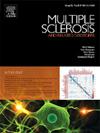多发性硬化症患儿治疗管理依从性量表的开发和心理测量学评估。
IF 2.9
3区 医学
Q2 CLINICAL NEUROLOGY
引用次数: 0
摘要
背景:小儿多发性硬化症(pMS)是一种影响儿童和青少年中枢神经系统的慢性炎症性、脱髓鞘性和神经退行性疾病:方法:使用两种测量工具来开发一种科学合理的工具,用于评估被诊断为多发性硬化症(MS)的儿童患者(12-18 岁)的治疗依从性。2021年8月至2022年2月期间,土耳其7家医院的多发性硬化症病例(n = 120)被纳入其中。调查工具包括 "社会人口学和疾病相关信息 "和新开发的 "多发性硬化症儿童治疗管理依从性量表"。表格和问卷均由患儿通过 Zoom 平台在线完成,耗时约 10 分钟。治疗依从性问卷包含 16 个与疾病和治疗相关的项目,采用 5 点李克特评分法。通过对 20 名儿童进行预试确定了面效度,并使用探索性因子分析和确认性因子分析的统计方法确定了建构效度。量表的信度采用 Cronbach's Alpha 和 omega 系数、项目测试相关值、分裂半数和重复测试技术:120名符合条件的患者中,71.2%为女性,发病时平均年龄(±SD)为13.6±2.2岁,研究时平均年龄(±SD)为15.7±1.5岁,所有患者均在接受疾病调节治疗。样本量和项目足以进行因子分析。Cronbach's Alpha 和 Omega 值为 0.75,表明参与者对不同项目的看法是一致的。内容效度指数的平均值为 0.93,表明量表代表了测量数据,探索性因子分析显示量表测量了 55% 患者的依从性(期望值分别为:>0.80 和 40-60%)。问卷的 16 个项目被分为 4 个维度。这些维度被称为 "生理"、"自我概念"、"角色功能 "和 "相互依存",以符合不同的适应风格。总分介于 16 分和 80 分之间,分数越高,表明对治疗的依从性越强。本研究的平均总分为 54.3 ± 9.53(最低 31 分,最高 75 分),属于 "中等依从性 "范围:结论:这一新量表是首个评估经前期综合征患者依从性的量表。本研究证实了该量表的有效性、可靠性以及准确解决儿童和青少年多发性硬化症患者适应问题的可能性,建议临床使用。本文章由计算机程序翻译,如有差异,请以英文原文为准。
Development and psychometric evaluation of the treatment management adherence scale for children with multiple sclerosis
Background
Pediatric multiple sclerosis (pMS) is a chronic inflammatory, demyelinating, and neurodegenerative disease affecting the central nervous system in children and adolescents The aim of this correlational, comparative study was to develop an assessment scale for adherence to treatment management in pMS.
Methods
Two measurement tools were used to develop a scientifically sound tool to assess adherence in pediatric patients (12–18 years) diagnosed with multiple sclerosis (MS). Cases of pMS (n = 120) in 7 hospitals in Turkey were included between August 2021-February 2022. The tools were a "Sociodemographic and Disease-Related Information" and a newly developed "Treatment Management Adherence Scale for Children with Multiple Sclerosis”. The form and questionnaire were completed by the children through online using the Zoom platform in approximately 10 min. The questionnaire on adherence contains 16 items related to the disease and treatment, scored in a 5-point Likert type. Face validity was established by pretesting with 20 children, and construct validity was established using the statistical methods of exploratory factor analysis and confirmatory factor analysis. For the reliability of the scale, Cronbach's Alpha and omega coefficients, item test correlation values, split-half, test-retest techniques were used.
Results
There were 120 eligible patients, 71.2 % girls, with mean age (±SD) 13,6 ± 2,2 years at disease onset and 15,7 ± 1,5 at the time of the study, all under disease-modifying therapy. The sample size and items were sufficient to conduct a factor analysis. The Cronbach's Alpha and Omega value was 0.75, indicating participants’ opinions were consistent across items. The mean content validity index was 0.93, showing the scale represented the measured data, and the exploratory factor analysis showed the scale measures adherence in 55 % of patients (desired figures: >0.80 and 40–60 % respectively). The 16 items of the questionnaire were grouped into 4 dimensions. These dimensions were termed 'physiological', 'self-concept', 'role function' and 'interdependence', in line with different styles of adaptation. The total score can be between 16 and 80, with higher scores indicating strong adherence to treatment. The mean total score of 54,3 ± 9,53 (min=31, max= 75) in this study was in the “moderate adherence” range.
Conclusions
This new scale is the first to assess adherence in pMS. The study supports its validity, reliability, and likelihood to address adjustment issues in children and adolescents with MS accurately and can be recommended for clinical use.
求助全文
通过发布文献求助,成功后即可免费获取论文全文。
去求助
来源期刊

Multiple sclerosis and related disorders
CLINICAL NEUROLOGY-
CiteScore
5.80
自引率
20.00%
发文量
814
审稿时长
66 days
期刊介绍:
Multiple Sclerosis is an area of ever expanding research and escalating publications. Multiple Sclerosis and Related Disorders is a wide ranging international journal supported by key researchers from all neuroscience domains that focus on MS and associated disease of the central nervous system. The primary aim of this new journal is the rapid publication of high quality original research in the field. Important secondary aims will be timely updates and editorials on important scientific and clinical care advances, controversies in the field, and invited opinion articles from current thought leaders on topical issues. One section of the journal will focus on teaching, written to enhance the practice of community and academic neurologists involved in the care of MS patients. Summaries of key articles written for a lay audience will be provided as an on-line resource.
A team of four chief editors is supported by leading section editors who will commission and appraise original and review articles concerning: clinical neurology, neuroimaging, neuropathology, neuroepidemiology, therapeutics, genetics / transcriptomics, experimental models, neuroimmunology, biomarkers, neuropsychology, neurorehabilitation, measurement scales, teaching, neuroethics and lay communication.
 求助内容:
求助内容: 应助结果提醒方式:
应助结果提醒方式:


